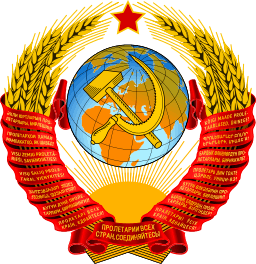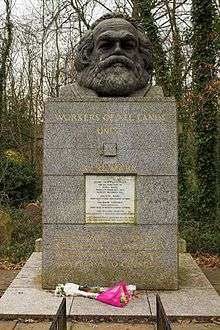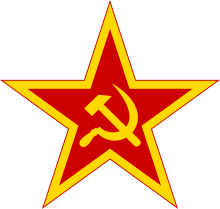Workers of the world, unite!

The political slogan "Workers of the world, unite!" is one of the most famous rallying cries from The Communist Manifesto (1848)[1][2][3][4][5] by Karl Marx and Friedrich Engels (German: Proletarier aller Länder vereinigt Euch!, literally "Proletarians of all countries, unite!",[6] but soon popularised in English as "Workers of the world, unite! You have nothing to lose but your chains!").[6][lower-alpha 1] A variation of this phrase ("Workers of all lands, unite") is also inscribed on Marx's tombstone.[8] The essence of the slogan is that members of the working classes throughout the world should cooperate to achieve victory in class conflict.
Overview
Five years before The Communist Manifesto, this phrase appeared in the 1843 book The Workers' Union by Flora Tristan.[9]
The International Workingmen's Association, described by Engels as "the first international movement of the working class" was persuaded by Engels to change its motto from the League of the Just's "all men are brothers" to "working men of all countries, unite!".[10] It reflected Marx's and Engels' view of proletarian internationalism.
The phrase has overlapping meanings: first, that workers should unite in unions to better push for their demands such as workplace pay and conditions;[11] secondly, that workers should see beyond their various craft unions and unite against the capitalist system;[12] and thirdly, that workers of different countries have more in common with each other than workers and employers of the same country.
The phrase was used by the Industrial Workers of the World (IWW) in their publications and songs[13][14] and was a mainstay on banners in May Day demonstrations. The IWW used it when opposing World War I in both the United States[14] and Australia.[15]
The slogan was the Soviet Union's state motto (Пролетарии всех стран, соединяйтесь!; Proletarii vsekh stran, soyedinyaytes'!) and it appeared in the State Emblem of the Soviet Union, on 1919 Russian SFSR banknotes (in Arabic, Chinese, English, French, German, Italian and Russian), on Soviet coins from 1921 to 1934 and in most Soviet newspapers. The nascent Soviet Union under Vladimir Lenin was oriented toward international communism.
Contemporarily, some socialist and communist parties continue using it.[16] Moreover, it is a common usage in popular culture, often chanted during labor strikes and protests.[17]
Variations

In the first Swedish translation of The Communist Manifesto, published in 1848, the translator Pehr Götrek substituted the slogan Folkets röst, Guds röst! (i.e. Vox populi, vox Dei, or "The Voice of the People, the Voice of God"). However, later translations have included the original slogan.
Amongst Maoist-oriented groups a variation invented by Vladimir Lenin, "Workers and Oppressed Peoples and Nations of the World, Unite!", is sometimes used. This slogan was the rallying cry of the 2nd Comintern congress in 1920 and denoted the anti-imperialist and anti-colonialist agenda of the Comintern.
Non-English usage
The phrase has been translated into many languages. All of the Soviet Socialist Republics in the Soviet Union had it as their motto translated into the local languages.
- Abkhaz: Abkhazian: апролетарцәа атәылақуа ӡегьы рҿы иҟоу, шәҽеидышәкыл!
- Afrikaans: Afrikaans: werknemers van die wêreld, verenig!
- Albanian: proletarë të të gjitha vendeve, bashkohuni!
- Arabic: Arabic: !يَا عُمَّال العَالَم اِتَّحِدُوا
- Armenian: Armenian: պրոլետարներ բոլոր երկրների, միացե՛ք
- Asturian: trabayadores de tolos países, xuníivos
- Avar : {Avar: Киналго улкабазул пролетарал, цолъе нуж!
- Azeri: Azerbaijani: bütün ölkələrin proletarları, birləşin!
- Cyrillic: Azerbaijani: бүтүн өлкәләрин пролетарлары, бирләшин!
- Bashkir:Bashkir: Бөтә илдәрҙең пролетарийҙәре, берләшегеҙ!
- Latin:Bөtә ildәrđen̡ proletarđarь berlәşegeđ!
- Basque: Basque: herrialde guztietako proletarioak, elkar zaitezte!
- Belarusian: Belarusian: пралетарыі ўсіх краін, яднайцеся!
- Bengali: Bengali: দুনিয়ার মজদুর এক হও! duniẏār majadur eka haō!
- Bulgarian: Bulgarian: пролетарии от всички страни, съединявайте се!
- Buryat: Buryat: бүхы оронуудай пролетаринар, нэгэдэгты!
- Catalan: Catalan: proletaris de tots els països, uniu-vos!, proletaris de tot el món, uniu-vos!
- Cebuano: Cebuano: mga trabahador sa mundo, paghiusa!
- Chechen: Chechen: массо а мехкийн пролетареш, цхьанакхета
- Chinese:
- Chuvash: Chuvash: пӗтӗм тӗнчери пролетарисем, пӗрлешӗр!
- Czech: Czech: proletáři všech zemí, spojte se!
- Danish: Danish: proletarer i alle lande, foren jer!
- Dargin Template:Lang-dar
- Dutch: Dutch: proletariers aller lander, vereinigt euch!
- Eastern Mari: Mari: чыла элласе пролетарий-влак ушныза!
- Esperanto: Esperanto: proletoj de ĉiuj landoj, unuiĝu!
- Estonian: Estonian: kõigi maade proletaarlased, ühinege!
- Finnish: Finnish: kaikkien maiden proletaarit, liittykää yhteen!
- French: French: prolétaires de tous les pays, unissez-vous!
- Galician: Galician: traballadores do mundo, unídevos!
- Georgian: Georgian: პროლეტარებო ყველა ქვეყნისა, შეერთდით!
- German: German: Proletarier aller Länder, vereinigt euch!
- Greek: Greek: προλετάριοι όλου του κόσμου, ενωθείτε!, Greek: προλετάριοι όλων των χωρών, ενωθείτε!
- Hebrew: Hebrew: פועלי כל העולם התאחדו poaley kol ha-olam, hit'akhadu!
- Hindi: Hindi: विश्व के कार्यकर्ताओं ने एकजुट हो जाओ viśva ke kāryakartāõ ne ekajuṭ ho jāo!
- Hungarian: Hungarian: világ proletárjai, egyesüljetek!
- Icelandic: Icelandic: öreigar allra landa, sameinist!
- Indonesian: Indonesian: kaum buruh sedunia, bersatulah!
- Irish: Irish: a oibrithe an domhain, aontaigí!
- Italian: Italian: lavoratori di tutto il mondo, unitevi!, proletari di tutti i paesi, unitevi!
- Japanese: Japanese: 万国の労働者よ、団結せよ! bankoku no rōdōsha yo, danketsu seyo!
- Karachay-Balkar: Karachay-Balkar: бютеу дунияны пролетарлары, бирлешигиз
- Karakalpak: Karakalpak: барлык еллердин пролетарлары, бирлесиниз!
- Kazakh: Kazakh: барлық елдердің пролетарлары, бірігіңдер!
- Lao: Lao: ຊົນຊັ້ນກຳມະຊີບທົ່ວໂລກ ຈົ່ງສາມັກຄີກັນ!
- Latin (2018): Kazakh: Barlyq elderdiń proletarlary, birigińder!
- Komi-Zyrian: Template:Lang-kpv
- Korean: Korean: 모든 나라의 노동자여, 단결하라!/萬國의 勞動者여 團結하라!
- Kurdish: Kurmanji Kurdish: karkerên cîhanê hevgirin!, کرێکارانی دنیا یهکگرن kirêkaranî dinya yekgirin!
- Kyrgyz: Kyrgyz: бардык өлкөлордүн пролетарлары, бириккиле!
- Latin: Latin: Proletarii omnibus terrarum, sociate!
- Latvian: Latvian: visu zemju proletārieši, savienojieties!
- Lithuanian: Lithuanian: visų šalių proletarai, vienykitės!
- Macedonian: Macedonian: пролетери од сите земји, обединете се!
- Malagasy: Malagasy: mpiasa eran'izao tontolo izao, mampiray!
- Malay: Malay: kaum buruh semua negeri, bersatulah!
- Malayalam: Malayalam: സര്വ രാജ്യ തൊഴിലാളികളെ സംഘടിക്കുവിന്
- Mongolian:
- Cyrillic: Mongolian: орон бүрийн пролетари нар нэгдэгтүн!
- Traditional: ᠪᠦᠬᠥ ᠳᠡᠯᠡᠬᠡᠶ ᠶᠢᠨ ᠦᠭᠡᠶᠢᠭᠦᠴᠦᠳ ᠬᠣᠯᠪᠣᠭᠠᠯᠠᠭᠲᠤᠨ!
- Nepali: Nepali: हामी सबै मिलेर आमुल परिवर्तन ल्याऔ
- Nogai : Nogai: Баьри кыраллардынъ пролетарпары, бирлесинъиз!
- Norwegian:
- Persian: Persian: کارگران جهان متحد شوید
- Polish: Polish: proletariusze wszystkich krajów, łączcie się!
- Portuguese: Portuguese: trabalhadores do mundo, uni-vos!, Portuguese: proletários de todos os países, uni-vos!
- Romanian: Romanian: proletari din toate țările, uniți-vă!
- Cyrillic: Romanian: пролетарь дин тоате цэриле, уници-вэ!
- Russian: Russian: пролетарии всех стран, соединяйтесь!
- Serbo-Croatian:
- Cyrillic: Serbo-Croatian: пролетери свих земаља, уједините се
- Roman: Serbo-Croatian: proleteri svih zemalja, ujedinite se
- Slovak: Slovak: proletári všetkých krajín, spojte sa!
- Slovene: Slovene: proletarci vseh dežel, združite se!
- Southern Altai: Altay: бардык ӧлкӧлордӱн пролетарлары, бириккиле!
- Spanish: (Spain) Spanish: trabajadores del mundo, uníos, (Spain) proletarios de todos los países, uníos, (Latin America) trabajadores del mundo, únanse, (Latin America) proletarios del mundo, uníos
- Swahili: wafanyakazi wa dunia, ungana!
- Swedish: proletärer i alla länder, förena er, proletärer i alla länder, förena eder!
- Tagalog: mga manggagawa ng daigdig, magkaisa!
- Tajik: пролетарҳои ҳамаи мамлакатҳо, як шавед!
- Tatar: барлык илләрнең пролетарийлары, берләшегез!
- Thai: ชนชั้นกรรมาชีพทั่วโลก จงสามัคคีกัน
- Tibetian: འཛམ་གླིང་ཡོངས་ཀྱི་འབྱོར་མེད་པ་རྣམས་མཉམ་འབྲེལ་གྱིས་ཤིག་!
- Turkish: bütün ülkelerin işçileri, birleşin!
- Turkmen: ähli ýurtlaryň proletarlary, birleşiň!
- Cyrillic: әхли юртларың пролетарлары, бирлешиң!
- Tuvan: бүгү чурттарның пролетарийлери, каттыжыңар!
- Udmurt: вань странаосысь пролетарийёс, огазеяське!
- Ukrainian: пролета́рі всіх краї́н, єдна́йтеся
- Uyghur:!پۈتۈن دۇنيا پىرولېتارلىرى ، بىرلىشىڭلار
- Uzbek: butun dunyo proletarlari, birlashingiz!
- Cyrillic: бутун дунё пролетарлари, бирлашингиз!
- Venda: Vhashumi vha mashango othe, tanganani!,
- Vietnamese: vô sản toàn thế giới, liên hiệp lại!, vô sản các nước, đoàn kết lại!
- Chữ Nôm: 無産全世界, 聯協徠!, 無産各𫭔(⿰国若), 團結徠!
- Welsh: gweithwyr y byd, unwch!
- West Frisian: arbeiders fan alle lannen, ferien!
- Yakut: бары дойдулар пролетарийдара, холбоһуҥ!
- Yiddish: פּראָלעטאריער פֿון אלע לענדער, פֿאַראייניקט זיך
- Zhuang: Gyoengq bouxfouzcanj daengx seiqgyaiq, lienzhab hwnjdaeuj!
 100 ruble of RSFSR at 1919
100 ruble of RSFSR at 1919 250 ruble of RSFSR at 1919
250 ruble of RSFSR at 1919 500 ruble of RSFSR at 1919
500 ruble of RSFSR at 1919 1,000 ruble of RSFSR at 1919
1,000 ruble of RSFSR at 1919 5,000 ruble of RSFSR at 1919
5,000 ruble of RSFSR at 1919 10,000 ruble of RSFSR at 1919
10,000 ruble of RSFSR at 1919
See also
Notes
- ↑ The final paragraph of The Communist Manifesto is translated by Samuel Moore as such: "The Communists disdain to conceal their views and aims. They openly declare that their ends can be attained only by the forcible overthrow of all existing social conditions. Let the ruling classes tremble at a Communistic revolution. The proletarians have nothing to lose but their chains. They have a world to win. WORKING MEN OF ALL COUNTRIES, UNITE!". This translation is the authorised translation by Marx and Engels and is the most commonly used version in English.[7]
References
- ↑ Gabrijela Kišiček; Igor Ž. Žagar (3 October 2013). What Do We Know About the World?: Rhetorical and Argumentative Perspectives. University of Windsor. p. 471. ISBN 978-0-920233-70-2.
One of the most famous rallying cries of communism Workers of the world, unite!
- ↑ Simon Levis Sullam (21 October 2015). Giuseppe Mazzini and the Origins of Fascism. Palgrave Macmillan US. p. 91. ISBN 978-1-137-51459-2.
only a few years later, would give the famous rallying cry Workers of t...
- ↑ Rick Sirmon (30 November 2011). In Search of George Washington: The Story of the 28th Amendment. Xlibris Corporation. p. 98. ISBN 978-1-4653-9768-3.
slogan “Workers of the World Unite. ... is the famous rallying cry of Communism foundin Marx's 1848 publication, The Communist Manifesto.
- ↑ Edward R. Kantowicz (1999). The Rage of Nations. Wm. B. Eerdmans Publishing. p. 21. ISBN 978-0-8028-4455-2.
titled The Communist Manifesto, which contained the famous rallying cry: "Workers of the w...
- ↑ Ronald Niezen (15 April 2008). A World Beyond Difference: Cultural Identity in the Age of Globalization. John Wiley & Sons. p. 129. ISBN 978-1-4051-3710-2.
The famous rallying cry from The Communist Manifesto, “workers of the world unite!” was meant only to hasten the [...]
- 1 2 "Translator's note to the Communist Manifesto". Marxists.org. Marxist Internet Archive. Retrieved 14 February 2015.
- ↑ Marx, Karl; Engels, Friedrich (2002). Jones, Gareth Stedman, ed. The Communist Manifesto (New ed.). London: Penguin. ISBN 978-0-140-44757-6.
- ↑ Wheen, Francis (2002). Karl Marx: A Life. New York: Norton. Introduction.
- ↑ Marie M. Collins and Sylvie Weil-Sayre (1973). "Flora Tristan: Forgotten Feminist and Socialist". Nineteenth-Century French Studies. 1 (4): 229–234. JSTOR 23535978.
- ↑ Lucia Pradella in 'The Elgar Companion to Marxist Economics.' Edited by Ben fine and Alfredo Saad-Filho, 2012, p.178.
- ↑ Wiktionary, entry for "Workers of the World"
- ↑ Karl Marx and Friedrich Engels, The Communist Manifesto, 1848.
- ↑ Joseph Grim Feinberg, "The Gifts of the IWW," Against the Current 117, July–August 2005.
- 1 2 Melvyn Dubofsky, We Shall Be All, Quadrangle Books, 1969.
- ↑ Nick Armstrong, "The Industrial Workers of the World," Socialist Alternative, June 2005.
- ↑ Thurston, Robert W.; Bonwetsch, Bernd (2000). The People's War: Responses to World War II in the Soviet Union (illustrated ed.). University of Illinois Press. ISBN 9780252026003. Retrieved 19 March 2015.
- ↑ "May Day celebrated on both sides of Line of Control". socialistworld.net. 6 May 2008. Retrieved 30 November 2010.
External links
| Wikimedia Commons has media related to Workers of the world, unite!. |
| Look up workers of the world, unite in Wiktionary, the free dictionary. |
- Manifesto of the Communist Party by Karl Marx and Friedrich Engels.
- Chapter 4 of The Communist Manifesto.
